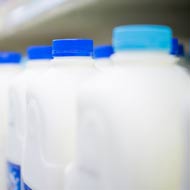Farmers clear supermarket shelves of milk

Dairy farmers across the UK are clearing supermarket shelves of milk in protest over falling prices.
Dairy farmers across the UK are clearing supermarket shelves of milk in protest over falling prices.
The latest demonstration took place on Monday at a Morrisons store in Ayreshire, Scotland, where a group of farmers filmed themselves filling up trolleys with milk amid claims that 19 Scottish farms have gone out of business this year.
The farmers say Morrisons pay as little as 74p for four pints, which they argue is far too low. However, the supermarket chain said that it had already agreed not to accept further cost price decreases from suppliers.
Similar protests have been held elsewhere in the UK over the last few days. Speaking to the BBC, Michael Shadwick, who led protest action in Bude, said that store staff has been 'overwhelmed' by their actions.
"We cleared the lot and yeah they're left with none now, so it's mission accomplished for us," he said. "Hopefully, the message will get back to their buyers that, you know, they need to support us."
Milk producers claim that the fall in milk prices has been due to challenging market conditions. Whilst supply has remained strong, the demand for milk has fallen significantly.
Darren Blackhurt, Morrisons group commercial director, told the BBC that the store tries to pass on lower prices to their customers wherever possible.
"We do recognise however, due to reduced global demand, that this has created an oversupply of British milk, creating difficult conditions for many dairy farmers at present.
"At a constructive meeting on Wednesday with the NFU Dairy board chairman, we confirmed that Morrisons is not accepting any further cost price decreases from our suppliers driven by the falling farm gate milk price," he said.



 HMRC has invited feedback to its communications regarding the employment status of locum vets and vet nurses.
HMRC has invited feedback to its communications regarding the employment status of locum vets and vet nurses.